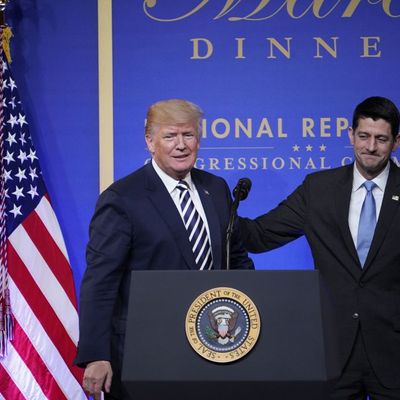
On Monday, a little under two months into his retirement, former House Speaker Paul Ryan gave a speech at the Riverside Theatre in Vero Beach, Florida, about an hour and a half north of Mar-a-Lago. For much of the hour-long lecture, the purported wonk discussed his policy successes (massive corporate tax cuts) and failures (not repealing the ACA), and his hopes for the current class in Congress: increased border security and an elimination of the green-card lottery.
Ryan, Mitt Romney’s running mate in 2012, also gave some interesting election advice for GOP voters in 2020. Believing that there are some candidates in the Democratic field who could beat President Trump, Ryan said that the incumbent must make his platform stand out through his policies, not just his personality: “The person who defines that race is going to win the race. If this is about Donald Trump and his personality, he isn’t going to win it.”
This piece of advice delivered in a 700-seat auditorium in South Florida rehashes why Ryan’s downfall occurred in the Trump era: The idea man was divorced from the id-heavy exploits of his party. Setting aside value judgements of the president’s thoughts and actions, what is Donald Trump if not personality? One of the primary factors of Trump’s Electoral College win was his persona as a self-made outsider — whether or not the image matched reality — shooting from the hip at policy ideas that were incongruent with his party. Since becoming president, Trump has reportedly taken the words of fellow ’80s New York icon Mike Tyson as a mantra: “Everybody has a plan until they get punched in the mouth.” One adviser told Axios that Trump “gets frustrated when there is a plan … There’s an animosity towards planning.”
A crucial piece of Trump’s 2016 electorate was the “low-information voter,” defined by political scientists Richard Fording and Sanford Schram as “those who do not know certain basic facts about government and lack what psychologists call a ‘need for cognition.’” In a Washington Post op-ed published two days before the 2016 election, the pair stated:
Our research finds that Trump has attracted a disproportionate (and unprecedented) number of “low-information voters” to his campaign. Furthermore, these voters are more likely to respond to emotional appeals — whether about the economy, immigration, Muslims, racial relations, sexism, and even hostility to the first African-American U.S. president, Barack Obama.
Barring a radical change in media habits or general outlook, it’s unlikely that these voters are going to be worried that Trump still has an undefined policy approach two years into his term. It certainly isn’t his droll public readings of policy proposals that make Trump a captivating speaker for the Republican base.
If anything, the focus on policy over personality is what set Ryan apart from the direction of the Republican leadership, which, at least in the Executive branch, is no longer a party of ideas. Perhaps if he had a better roadmap for the direction of the GOP, Ryan could have hung on in the age of Trump, rather than champion a wildly unpopular tax overhaul and tap out ahead of the GOP’s greatest loss in the House since 1974.
This post has been updated to reflect Paul Ryan’s former role as House Speaker.






























